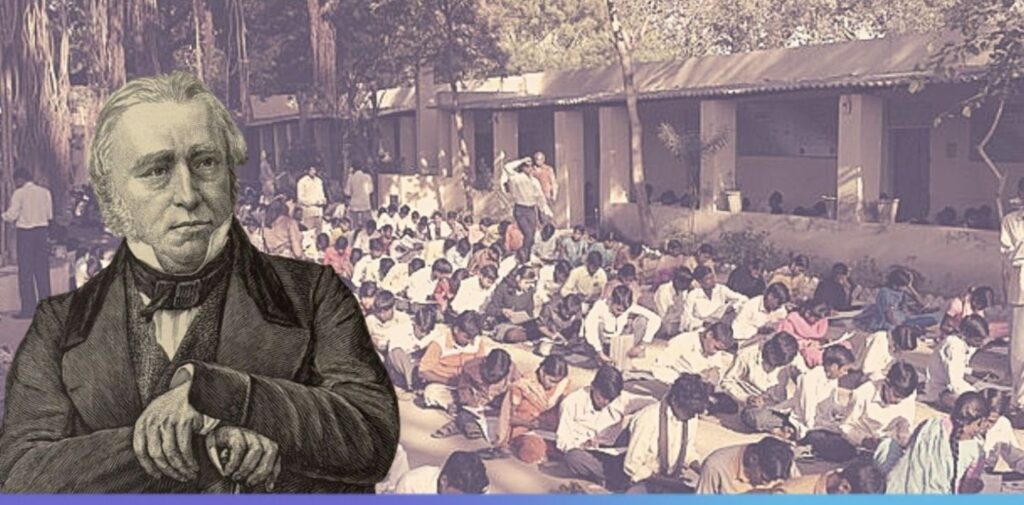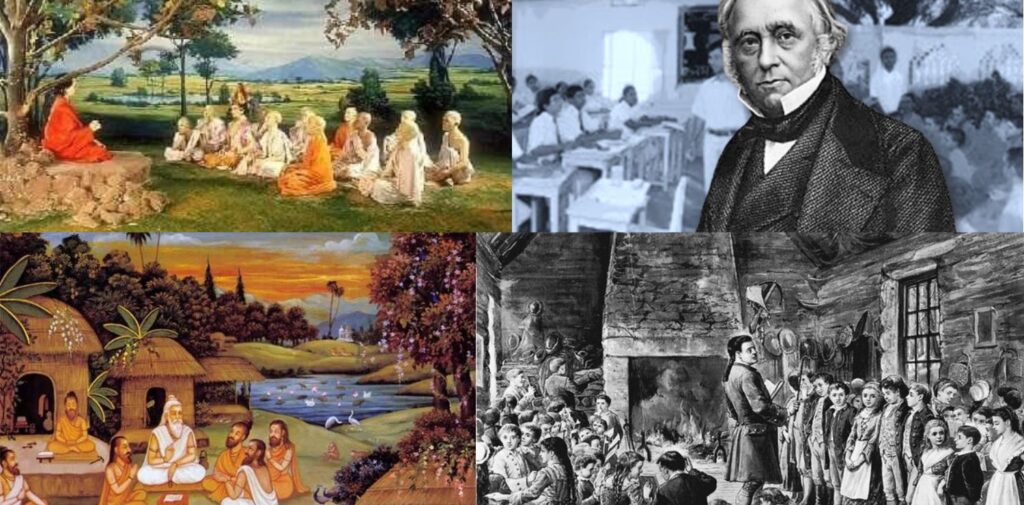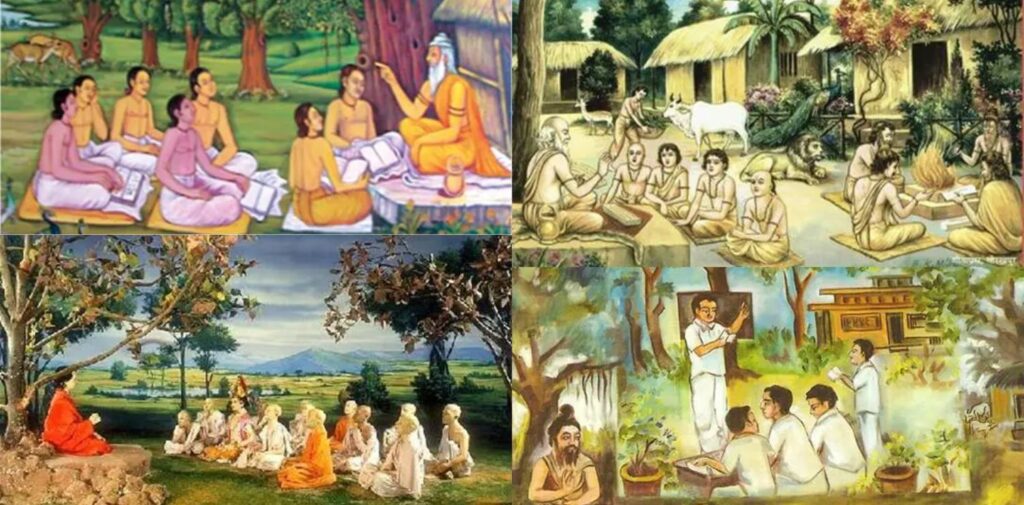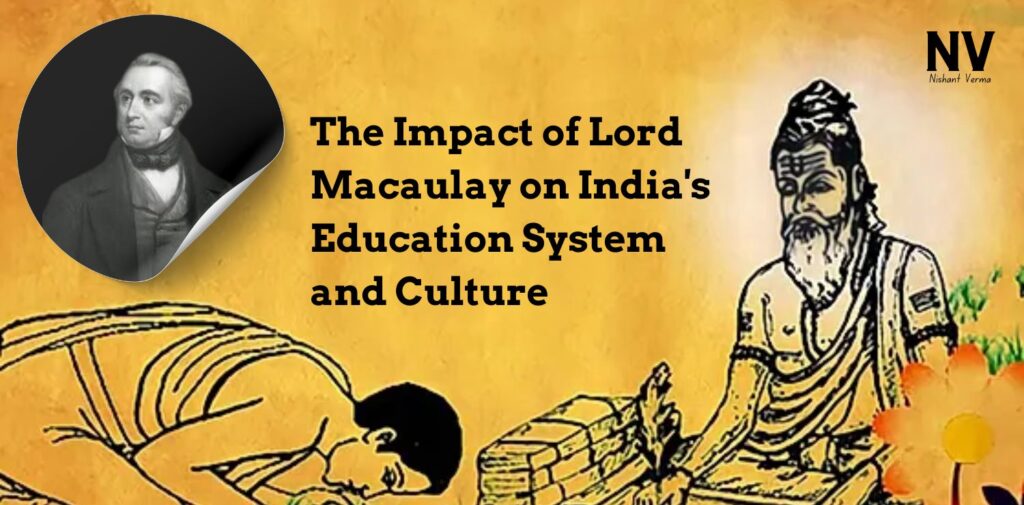Lord Thomas Babington Macaulay, a British historian and politician, played a pivotal role in shaping the modern Indian education system. His legacy is often seen as a deliberate attempt to undermine India’s rich cultural and educational heritage, especially the traditional Gurukul system that existed before British colonization. Lord Macaulay policies, which emphasized Western education and values, led to significant changes in the way Indian history, culture, and traditions were documented and taught. This article delves into the impact of Lord Macaulay’s educational reforms and how they altered India’s historical narrative.
The Traditional Indian Gurukul System
Before the British established their rule, India had a robust educational system. The Gurukuls were centers of learning where students stayed with their gurus (teachers) and holistically received education. Subjects ranged from philosophy, mathematics, science, and astronomy to arts, spirituality, and practical life skills. The system fostered a deep connection with Indian values and traditions, instilling moral and ethical principles alongside academic knowledge.
This indigenous system produced scholars, philosophers, and scientists who made significant contributions in various fields. The focus was not just on rote learning but on developing a comprehensive understanding of life and knowledge. However, the British colonizers, under Lord Macaulay’s guidance, perceived this system as a threat to their rule and sought to replace it with one that would produce a class of Indians who would serve the colonial administration.
Lord Macaulay’s Educational Policy: A Systemic Overhaul
In 1835, Macaulay introduced his famous “Macaulay Minute” on education, which laid the groundwork for a new education policy in India. He openly criticized the traditional Indian education system, claiming that it was of little use for modern governance. Macaulay argued that the existing Sanskrit and Persian literature was inadequate and backward, advocating for English to be the medium of instruction. His words captured his intentions: “We must at present do our best to form a class who may be interpreters between us and the millions whom we govern, a class of persons, Indian in blood and color, but English in taste, in opinions, in morals, and intellect.

The introduction of English as the primary medium of instruction in schools and colleges marked the beginning of a new educational era in India. Macaulay’s vision was to create a cadre of English-educated Indians who would assist in administration, thus easing the burden on British officials. However, this move also led to the suppression of indigenous languages and a loss of connection with Indian culture, history, and values.
Erasure and Manipulation of Indian History and Culture
One of the most profound effects of Macaulay’s education policy was the systematic erasure and manipulation of India’s historical and cultural narratives. Under his influence, the British curriculum was designed to downplay or completely ignore India’s contributions to science, philosophy, and art. The rich heritage of ancient Indian texts and literature, which had been preserved and passed down through generations, was either neglected or misrepresented.
Macaulay’s efforts to rewrite Indian history aimed to create an inferiority complex among Indians, making them believe that their own culture and traditions were inferior to Western civilization. Many historical texts were either altered or left out of the curriculum to serve this purpose. As a result, generations of Indians grew up learning a distorted version of their history, one that glorified the British Empire and diminished the achievements of Indian civilization.

Destruction of the Gurukul System and Rise of British Schools
With the implementation of Macaulay’s education reforms, the Gurukul system gradually declined. British-style schools and colleges were established across the country, and funded by the colonial government. The focus shifted to producing clerks, accountants, and other professionals who could serve the British administration. This new system prioritized English literature, British history, and Western sciences, sidelining subjects like Sanskrit, philosophy, and Indian classical knowledge.
The British educational institutions emphasized rote learning and examination-based assessment, which was in stark contrast to the Gurukul’s holistic approach. The shift not only changed the nature of education but also led to a disconnection from Indian values and traditions. The emphasis on English as the medium of instruction created a language barrier, alienating those who did not have access to English education from economic and social opportunities.
The Long-Term Impact on Indian Society
Macaulay’s education policy had long-lasting effects on Indian society. By prioritizing Western education and values, it created a class divide between English-educated elites and the rest of the population. The introduction of English as the primary language of instruction created an elite class that was fluent in English and looked down upon those who were not. This divide persists even today, with proficiency in English often being equated with intelligence and social status.
Furthermore, the erasure and alteration of India’s history and traditions have led to a loss of cultural identity. Many Indians, especially in urban areas, have grown up disconnected from their heritage, with little understanding of the contributions of ancient Indian scholars and philosophers. This disconnection has contributed to a sense of inferiority and a lack of pride in one’s own culture.

Reclaiming India’s Educational Heritage
In recent years, there has been a growing movement to reclaim and revive India’s traditional educational practices. Scholars and educators are advocating for a more balanced curriculum that incorporates the best of both Western and Indian knowledge systems. Efforts are being made to reintroduce subjects like Sanskrit, Indian philosophy, and ancient sciences into the mainstream curriculum.
The objective is not to reject Western education but to create a more inclusive system that values India’s cultural heritage and recognizes its contributions to global knowledge. This movement seeks to empower future generations with a sense of pride in their identity and history, enabling them to engage with the world from a position of strength and self-confidence.
Conclusion
Lord Macaulay’s educational reforms had a profound impact on Indian education system and cultural identity. By prioritizing English education and Western values, Macaulay sought to create a class of Indians who would serve the British administration. His policies led to the decline of the Gurukul system, the erasure of India’s historical and cultural narratives, and the creation of a class divide that persists to this day.
As India moves forward, there is a growing recognition of the need to revisit and reclaim its educational heritage. A balanced approach that integrates both Western and traditional Indian knowledge systems can help restore a sense of pride in India’s rich cultural history and empower future generations to contribute meaningfully to the global community.




